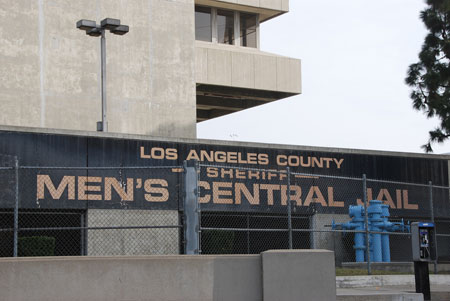ACLU Urges Supervisors To Close Men's Central Jail
Comments (7)

Los Angeles County's Men's Central Jail drives healthy prisoners to mental illness,
a recently released report says. (Creative Commons licensed)
Civil-rights activists urged the Los Angeles Board of Supervisors to take swift action Tuesday and close the central jail in the Los Angeles County Jail system after releasing a report that said conditions inside the jail ultimately led to mental illness even in healthy people.Â
The American Civil Liberties Union submitted the report to Los Angeles County Sheriff Lee Baca last year but elected to publicize it Tuesday after detainee John Horton, 22, committed suicide on March 30.
Horton had been exhibiting suicidal symptoms after weeks in solitary confinement and was found hanging in his windowless cell the size of a closet. He was in jail for drug possession charges.
"What makes the Men's Central Jail so horrific is the overcrowding of many thousands of men," said Margaret Winter, associate director of the ACLU's National Prison Project.Â
She said thousands of detainees are "suffering from serious mental illness, packed like sardines in dungeon-like barracks, or hidden away in solitary confinement in coffin-like cells for days, weeks, months or even years."Â
The 50-page report the ACLU released, produced by correctional medical healthcare expert and psychiatrist Terry Kupers, said that the enforced physical and mental idleness, perpetual filth and lack of basic medical and mental health care make the Men's Central Jail "an incubator for serious mental illness and complete psychiatric breakdown."Â
At the Men's Central Jail, detainees are kept in cells without natural light, healthy and mentally ill inmates are not separated, and cells are frequently filthy with rodents in them. It takes two to three times longer to move detainees through the jail than it does in other areas of the jail system.
Winter said the ACLU of Southern California submitted the report to Baca in July and urged the sheriff's department to begin making changes.
"There has been little or no progress in implementing any of these critically important reforms," she said.Â
Federal District Court Judge Dean D. Pregerson ordered the jails be reformed in 2006 and the ACLU of Southern California is the court-ordered monitor of conditions and medical care of the Los Angeles County Jail system.Â
In February Baca said the only solution to fixing the jail might be closing it altogether.
"He believes it should be dismantled and a new one should be built," said Steve Whitmore, a spokesman for the sheriff's department. "The Men's Central Jail has outlived its usefulness. When you change the design, it then makes it easier, safer and more secure to house inmates."Â
Tuesday's release of Kupers' findings confirmed those assessments. But the ACLU-commissioned report also found that "overcrowding at the jails leads to violence, victimization, custodial abuses and ultimately psychotic breakdown even in relatively healthy people, as well as potentially irreversible psychosis in detainees with pre-existing illness."Â
The report also said the jail's mental health staff routinely leave mentally ill inmates undiagnosed and downgrade serious diagnoses of inmates with long-held illnesses.Â
But the sheriff's department attributes those issues to overcrowding in the outdated facility.
"Jail is harsh," said Whitmore. "Can we say that whenever their individual rights are taken away it affects people's behaviors? Absolutely."
The downtown facility, constructed in 1963, was built on a linear model meant to house 3,323 prisoners. The jail housed as many as 6,500 people recently, and now has approximately 4,500 prisoners.
The new jail, Whitmore said, would be built with a pod layout, placing a custodial officer in a central location.Â
"The Board of Supervisors already supports to revise the new jail system county-wide," he said. "The challenge is resources of money and people and we're in a very difficult economic time now."
Baca said in February he was considering closing the jail in an attempt to trim the department's $2.5 billion budget. The department spends almost half its budget on holding prisoners and expenses related to that task.Â
"Closing the jail will save the county more than $250 million a year," said Melinda Bird, senior counsel of the ACLU of Southern California. "Taxpayers spend $50,000 per person per year to house inmates. That's more than what most people make in a year."
Bird, who calls the facility "medieval," said the county could save money by dealing with parole violators through close supervision, electronic monitoring, drug treatment programs and vocational training, instead of returning them to jail. She believes these efforts would divert detainees at the pretrial stage. Bird said the recidivism rate among healthy inmates is 81 percent and 95 percent for the mentally ill.Â
"We feel strongly that one of the answers is community-based mental health treatment," Bird said.Â
In his report, Kupers recommended decreasing the jail population and removing detainees with serious mental illness from the jail and placing them in treatment instead of solitary confinement.Â
"We can't afford the status quo," said Bird. "If Men's Central Jail can't be fixed, we need to close it and substitute more effective, less costly alternatives."



